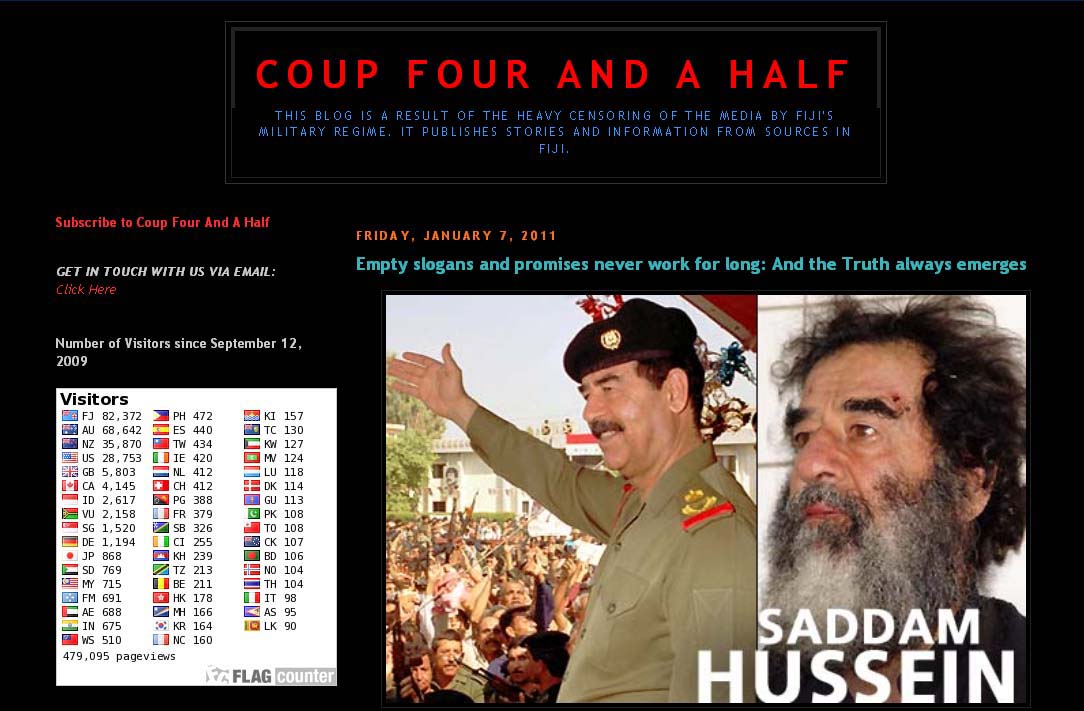
Crosbie Walsh has speculated on his upfront Fiji blog this week about the identity of an unnamed CoupFourPointFive spokesperson in an interview with Bruce Hill of the Australian Broadcasting Corporation. Hill also spoke to Attorney-General Aiyaz Sayed-Khaiyum on the topic of New Zealand media reports last November suggesting that PM Voreqe Bainimarama had "died". Of course, Bainimarama had the last laugh. The issue was about a planned complaint to the NZ Press Council about the false reports – a worrying trend considering that this could be the fourth time in two years that Pacific governments are exploiting the New Zealand media standards bodies to “chill” current affairs reporting. Also, the "action" item has been apparently ignored by NZ media. But Walsh also raised an ethical issue over why shield the identity of a blogsite commentator, a journalist who is clearly not at risk?
Walsh’s blog drew an interesting response from the “The ABC of getting it wrong” on the dubious granting of anonymity in these circumstances. The correspondent wrote:
Conventional practice in news and current affairs has it that interviewees should only have their identities concealed when there is a clear threat to their positions and the information being imparted is of such importance that there is a clear public interest in granting them anonymity.
The ABC would undoubtedly argue that one of the principals of Coup 4.5 deserves the cloak of anonymity because of the possibility of government retribution. But that's where any justification ends and even this depends on whether the person being interviewed was actually in Fiji and within striking distance of the alleged bully boys of the military.
Is he in danger on the streets of Auckland or Sydney? Not on the evidence thus far. Not only do regime critics thrive there but there's no indication whatsoever that Frank Bainimarama is a Saddam Hussein who orders death squads to pursue his opponents abroad. So how hazardous is this individual's position beyond being unmasked as a regime critic? Would he be captured, tortured and forced to reveal the secrets of 4.5? Maybe in Fiji in more fevered minds but nowhere else.
Where the ABC is really vulnerable to criticism and complaint is that this person's contribution to the debate was so pedestrian. Merely parroting the usual anti-regime line meant that nothing of what he said met the public interest test. There was no new information of such pressing urgency that the public benefited from hearing from the man with the mask.
Now, one might argue that I am anonymous in these columns. But this is comment, not news, an important distinction. And in any event, the whole world accepts that an entirely different set of conventions applies to the Bloggersphere. When it comes to news and information programs on a mainstream public broadcaster like the ABC, the audience clearly deserves better.
Yes, there are times when whistle-blowers deserve anonymity in the public interest, as well as their own, but this wasn't one of them. The whistle wasn't being blown on anything. Bruce Hill and his editors allowed a run-of-the-mill regime critic to sprout run-of-the-mill anti-regime criticism and in doing so, debased not just an importance convention but the credibility of the ABC.
Although Walsh - a retired professor who founded the development studies programme at both Massey University and the University of the South Pacific - does not have a media background himself, he manages to pose some searching questions about the contemporary nature of news and current affairs reporting in the Pacific region. And Café Pacific believes these questions are ignored at our peril. A day after the “masked interview” comment, another correspondent raised the issue of youth and absence of social-political memory and context among many journalists reporting today:
A recent editorial by Fred Wesley in The Fiji Times reminded me of how little collective memory is brought to bear on current events. In a piece on someone who'd managed to reach the ripe old age on 101, Wesley wrote in apparent awe that there were still people in Fiji who could remember the assassination of John F, Kennedy, the British colonial era and Fiji's independence. I've yet to reach three score years and can remember all three! You go back a lot longer and have accumulated much more knowledge. As the old saying goes, those who ignore history are doomed to repeat it.
But in the case of Fiji, it's the appalling general ignorance of the past that produces the same mistakes again and again. You've now got to be 23 years old to have even been born at the time of Rabuka's 1987 coup. And you've got to be 40 to have been born at Independence. Is it any wonder that these events are now regarded as ancient history and irrelevant to peoples' lives?
Touché.
* Media reports of Bainimarama's death sparks complaint - ABC's Pacific Beat
* I'm still alive, says Fiji PM - Fiji Broadcasting Corporation
* Go to the original Café Pacific item for full links



